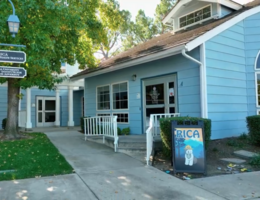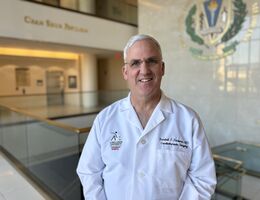
Jacqueline Dollard stands with her husband, Timothy, and daughters, Olivia and Claire
When Jacqueline Dollard, an Air Force Veteran, arrived at the emergency room at Loma Linda University Children’s Hospital, she wasn’t preparing to bring life into the world. She was grieving the loss of a pregnancy.
“I was there for a D&C,” she recalled, referring to the dilation and curettage procedure used after miscarriage. “It was the hardest thing I’ve ever gone through.”
What she expected to be a cold and clinical experience turned out to be something else entirely. Nurses quietly led her away from the delivery rooms. One held her hand during the procedure. A small group of women on staff surrounded her as she wept.
“I felt so supported and so loved by people I didn’t even know,” she said.
That loss would mark the beginning of a long and emotionally complex journey through motherhood. A year later, after a diagnosis of secondary infertility, Dollard became pregnant again. But her next experience was marked by repeated complications: hyperemesis gravidarum (a severe form of pregnancy-related nausea), a car accident, abdominal pain caused by hernias, and fears about decreased fetal movement.
Throughout it all, Dollard remained under the care of an expansive, multidisciplinary team at Loma Linda University Children’s Hospital, one that coordinated closely to manage her evolving health needs.
“I was constantly afraid to lose the baby,” she said. “But my doctors never made me feel like I was overreacting. They listened, they reassured, and they acted when I needed them.”
Dollard’s experience underscores a larger shift in maternal health: pregnancy at age 35 and older, once considered risky and unusual, is increasingly common. Similarly, there is a need for comprehensive, personalized care.
Danielle Mason, MD, an obstetrician-gynecologist at Loma Linda University Children’s Hospital, is among a growing number of maternal health experts calling for more preconception counseling and team-based prenatal care, particularly for patients categorized as of “advanced maternal age.”
“In women over 35, we see a higher likelihood of pre-existing conditions like diabetes and hypertension,” Mason said. “But with early intervention and a supportive care team, many of these risks can be managed effectively.”
Dollard’s daughter, Olivia, was diagnosed in utero with pyelectasis, a kidney condition that typically resolves on its own. Pediatric urologists were brought in before delivery. A scheduled C-section was chosen for safety, and after being born at the San Manuel Maternity Pavilion, and Olivia did not require a stay in the neonatal intensive care unit.
When Dollard became pregnant again just a year later, her medical team was ready. The same treatments that had worked previously were immediately put in place. The second pregnancy was notably smoother.
Mason said stories like Dollard’s highlight the importance of planning, especially for women who may be entering pregnancy with underlying health concerns.
“Even if you’re not over 35, preconception counseling allows us to look at the whole picture, lifestyle, medications, vitamin intake, chronic conditions, and build a care plan that supports a healthy pregnancy,” she said.
She also pointed to cardiovascular issues as an area of growing concern in maternal mortality which remains alarmingly high in the United States compared to other developed nations. Symptoms like chest pain or shortness of breath, often dismissed during pregnancy, can signal more serious issues.
“Women shouldn’t be afraid to bring up symptoms,” Mason said. “And providers need to take them seriously.”
In addition to medical care, Mason encourages expectant mothers to build support systems through the use of doulas, exercise routines, and mental health practices. All of these, Mason says, contribute to better outcomes during and after pregnancy.
“Find your team,” Dollard said. “Trust your instincts. And don’t be afraid to speak up, even if it feels small. Your peace of mind matters.”


